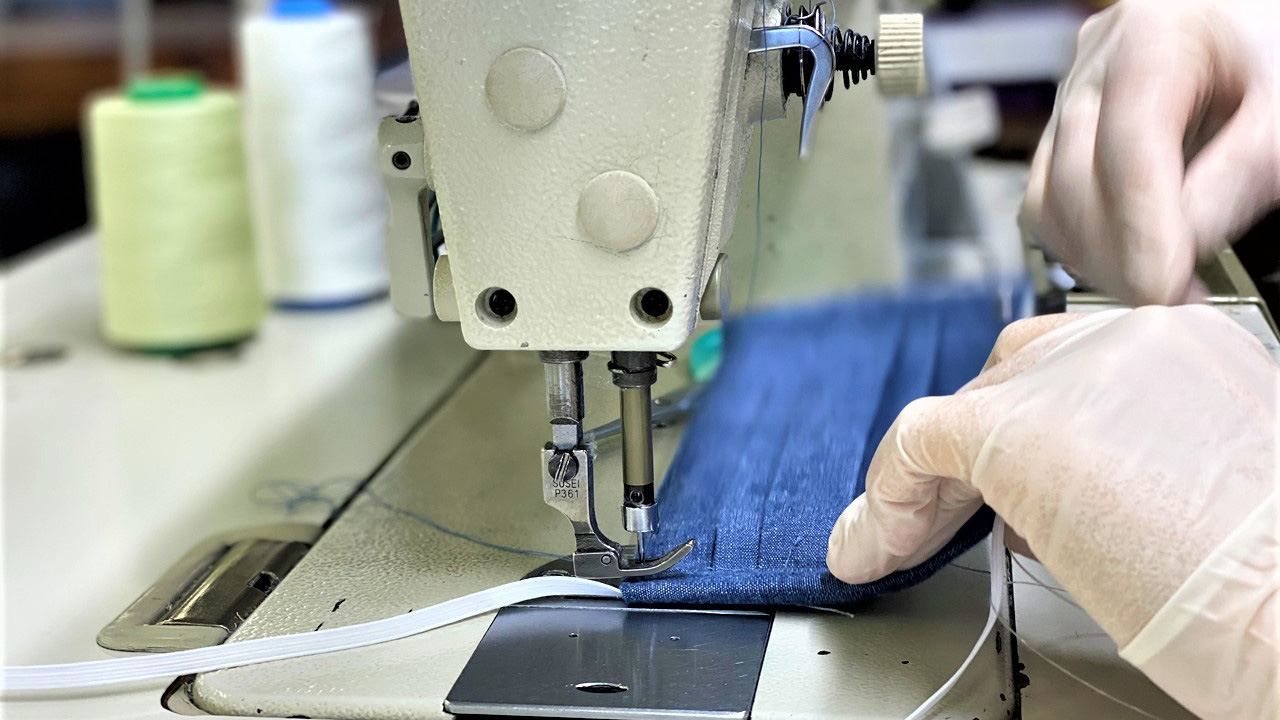
Coronavirus Summer: Traditional Craftsmanship for Masks to Beat the Heat
Society Culture Lifestyle Economy Health- English
- 日本語
- 简体字
- 繁體字
- Français
- Español
- العربية
- Русский
A Breath of Cool Air
Satō Masaki, fourth-generation president of textiles and knitwear company Satō Sen’i, beams as he describes his firm’s latest innovative product, a face mask made from traditional handmade Japanese paper. “People probably expect a washi mask to be quite hard and rough against the skin,” he explains. “But we use the same washi threads as in our apparel products, so it’s really quite soft.”
The company is based in Sagae in Yamagata Prefecture, an area that boasts a long textile tradition. The region experiences heavy snowfalls and winter was customarily a time for raising silkworms. Following the Meiji Restoration in 1868, the Japanese government made the development of a modern textile industry national policy, and within a few years spinning mills and knitting factories flourished. At the height of the boom, there were as many as 400 textile mills in the town. However, the industry has struggled to compete against lower-priced products from overseas, and today just 20 manufacturers remain. Satō's passion for the local industry remains strong, though. “Our ambition is to offer the world new and original products created right here in Sagae.”
The company’s innovative, high-quality threads are already highly sought out by international clothing brands, and Satō says the new washable washi mask is another product born of the firm’s attention to detail and quality. The coronavirus pandemic created a shortage of masks, inspiring Satō to develop a high-performance face covering that would “tap into our strengths in knitwear.”
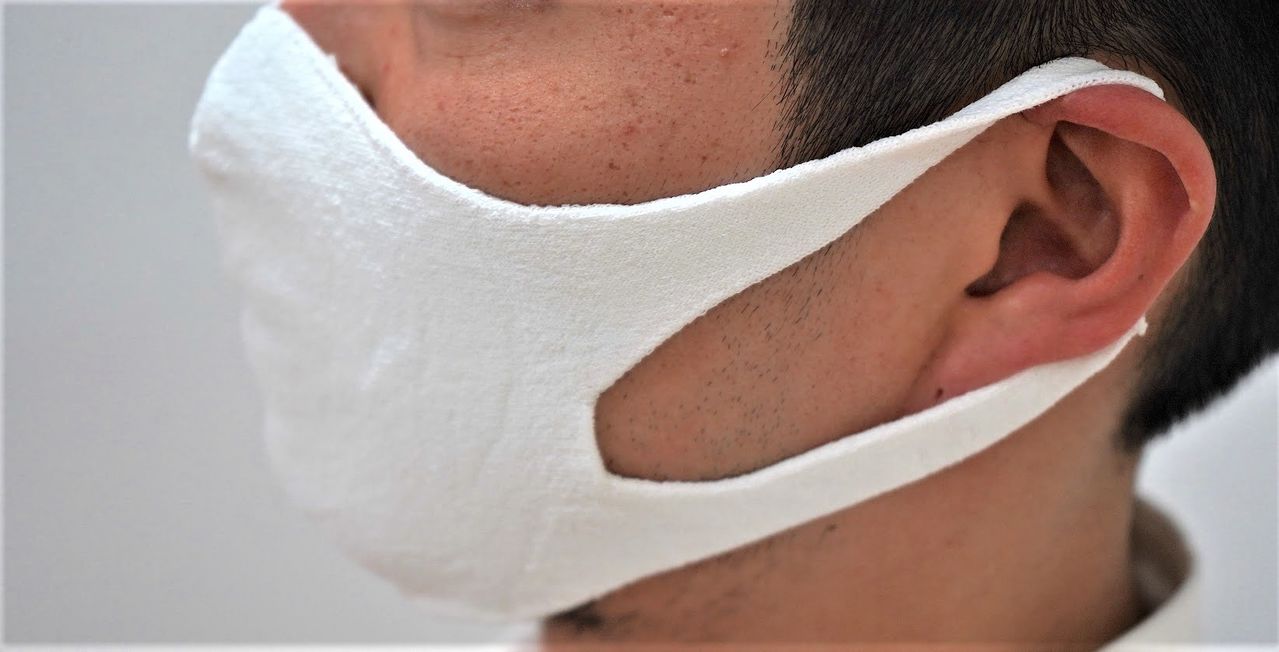
A sheet sewn with copper-coated thread is inserted into the mask pocket to help guard against germs and odors. (Photo courtesy of Satō Sen’i)
Most washable masks on the market are made from cotton-based materials. While cotton has the advantage of being highly absorbent, it is also slow to dry. This is a cause for concern in warm, humid conditions as it provides a suitable environment for germs to flourish. With balmy summer weather on the way, Satō decided to concentrate his attention on washi, which offers breathability and dries quickly.
“With conventional washi, we normally cut the material into long thin strips that are then twisted into threads,” Satō explains. “But this results in a certain amount of coarseness, so to improve the feel of the fabric against the skin, we cut slits into the paper and crumpled it before twisting the washi in combination with polyester, resulting in a much softer material.”
This method produces an ultra-thin type of washi weighing just 12 grams per square meter. Utilizing the same machines as used to create the company’s knitwear, Satō and his team molded the material into a form that envelopes the face of the wearer. In tests using a regular domestic washing machine, the mask maintained its shape even after some 300 washes.
Satō says the current crisis has opened his eyes to the potential of Japanese textiles and knitwear. “Japan is ideally placed to play a leading role in this emerging new mask market,” he says. “I’m delighted that we’ve been able to contribute by producing a mask that combines a traditional Japanese material like washi with modern technology.” He insist that this is just the beginning for the company and that his team is looking to work on other innovations that leverage Japanese strengths and traditions.
Ancient Elegance in a Silk Mask
Kyōto Shiruku Kakō, a silk processer located in the Fushimi district of Kyoto, has also turned its sights to masks. The company’s “Fairy Silk Mask” is made entirely from silk fiber and has proven popular with women with sensitive skin.
With its glossy sheen and smooth texture, silk has long been prized as a fabric for luxury clothing. It’s beneficial effect on the skin is thought to derive from the fact that it is largely made up of proteins produced naturally within the bodies of silkworms. Silk is ideal for use year round, offering coolness in the summer and warmth in the cooler months.
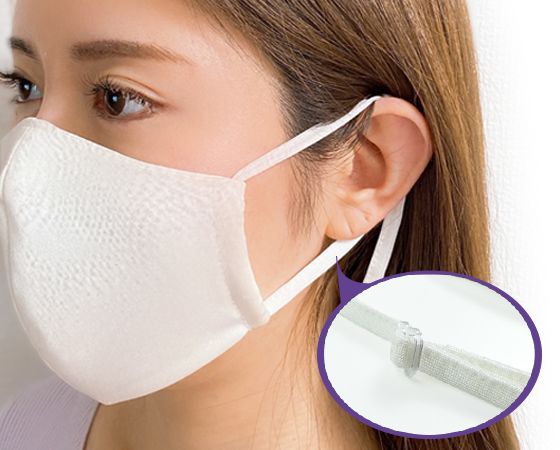
The mask is made with the same soft-knitted silk used for the company’s line of baby clothes and features with an adjustable strap. (Photo courtesy of Kyōto Shiruku Kakō)
Since its founding in 1985, the company has focused on products that maximize the natural qualities of silk. Its bestselling product is a pure silk towel for removing makeup The idea for the product came from a skincare trick apparently common among geishas in Kyoto’s teahouses of using scraps of silk left over from the sewing of their kimonos to wipe away their makeup, cultivating a pure and soft skin. “Silk is considered a luxury, and people told us it was absurd to use such a premium fabric on a towel,” says the company’s chief director, Yoshida Chie.
Operating out of a small factory near the UNESCO World Heritage temple of Daigoji, the firm is a fine example of a traditional family-run Kyoto business. It employs a team of five craftspeople who make every detail of the company’s products by hand.
“We make a ‘night mask’ that people can wear to prevent dryness in the throat when sleeping,” Yoshida explains. “A customer told us that wearing a synthetic fiber face mask every day had made her skin break out, but placing a silk mask underneath resolved the problem. This inspired us to develop an improved mask that would address some of the issues that can arise from wearing a face covering for long periods.”
A Denim Mask from Okayama
Okayama is famous as a denim-producing region to the extent that the name of the prefecture has become an internationally recognized byword for quality. Ihara and Kashima areas flourished for many years as production centers for indigo-dyed textiles, and small factories in these areas continue to produce some of the finest and most sought-after denim in the world today. One of these companies, Aoki Hifuku, recently released a washable denim facemask that has proved such a hit that the company has struggled to keep up with demand—and not just with the usual clientele of fashionistas and denim fans.
“Normally, with jeans, the color fades over time—that’s part of the appeal of the fabric,” says company director and designer Aoki Toshiki. “But the new mask is quite different.” He explains that his team worked hard to develop a type of denim that would hold its color and look new even after as many as 30 washings.
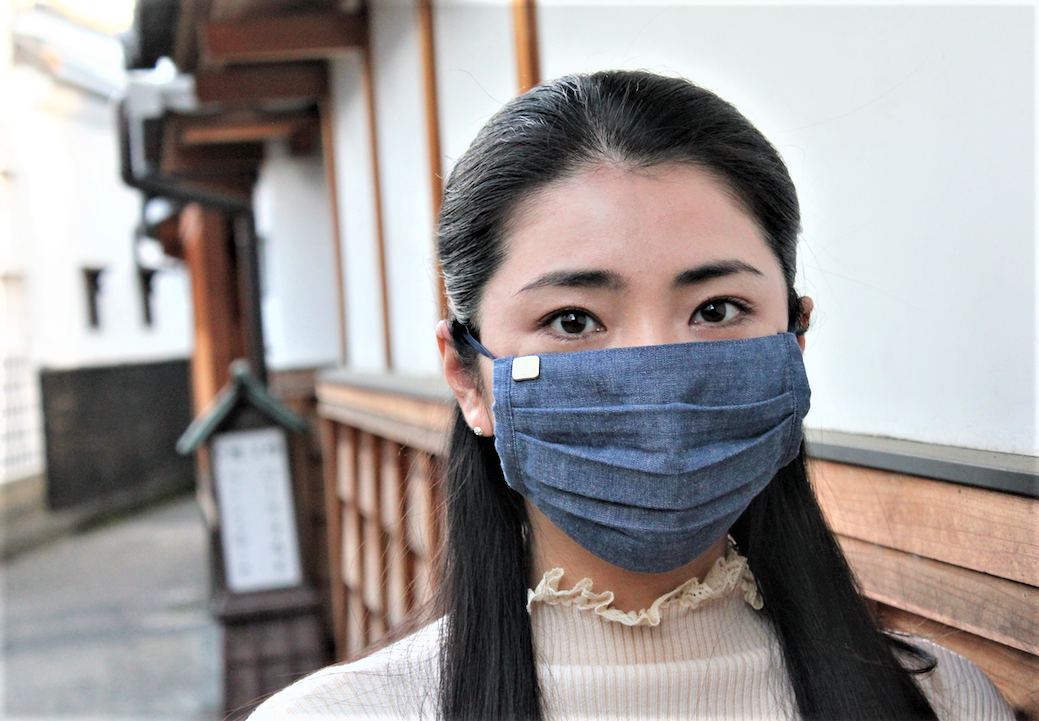
The denim exterior is backed by two sheets of silk fabric and sewn with pleats, taking care that the stitches do not show on the outside. (Photo courtesy of Aoki Hifuku)
The company started developing the new product in mid-March on the advice of the firm’s bank manager, who suggested that there might be demand for reusable denim masks. Made from the same fabric used in chambray shirts—the lightest type of denim, with the best breathability—the mask offers a pleasing pleated design. Aoki says that although it more complicated to produce, requiring intricate sewing techniques, he refused to compromise on quality and in the end the company came up with a mask that is stylish and comfortable.
Ihara denim is known for its fine, soft fabric and smooth colors—both characteristics that are well in evidence in the new mask. One of the secrets behind the premium quality feel of the mask is the fade-resistant colors produced by reactive dyeing, a process in which the dye is soaked into the threads before sewing. Aoki says the production of the new mask is completely sustainable and environmentally friendly “After dyeing, the water released from the factory is subject to strict environmental standards,” he explains. “It is used in fields to grow vegetables and rice for the town.”
Gold-Medal Technology
The COVID-19 pandemic has had a profound impact on the apparel industry. In May, Renown, one of the biggest corporations in the sector, was forced to declare bankruptcy after business plummeted. The one ray of light amid the economic doom and gloom has been the way regional fabric suppliers have seized the opportunity to offer their wares directly to end consumer. One good example of this is Hatta Warp Knitting, located in Sabae, Fukui Prefecture.
The firm is a well-known name among footwear makers for its ultra-fine mesh. Takahashi Naoko, who became the first Japanese woman to win Olympic marathon gold at the 2000 summer games in Sydney, and Noguchi Mizuki, who continued Japan’s medal run in the event in 2004 in Athens, both wore shoes featuring this special fabric.
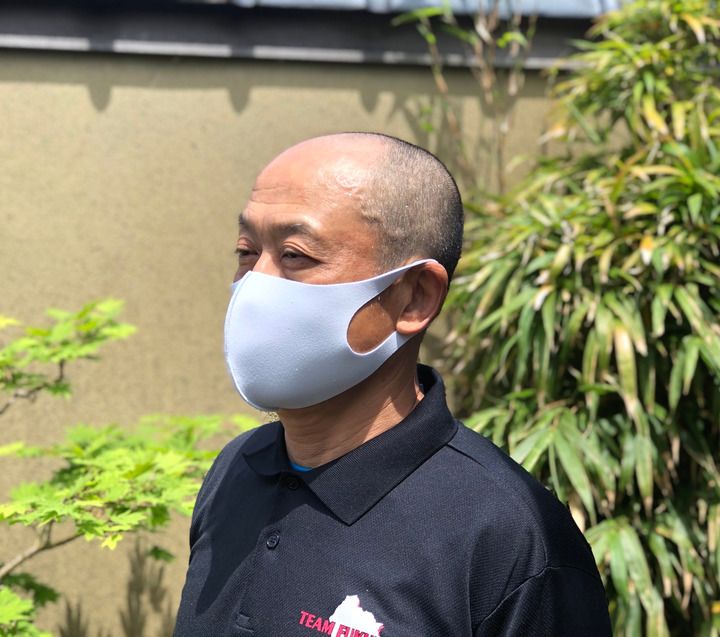
The three-layered mesh fabric consists of inner and outer surfaces and a connecting layer, offering outstanding breathability and cushioning. (Photo courtesy of Hatta Warp Weaving)
Since its founding in 1949, the company has continued to look to develop the potential of its mesh in different fields, from shoes for elite runners to high-performance fabrics for sporting apparel to materials for car seats. An originally branded product, the new mask brings the company’s technology out of the wings and onto the main stage.
“We had the idea of selling directly to customers for some time,” explains Saho Shouko, head of product development. “But when the pandemic hit, it became a matter of survival. We originally developed the masks for our employees to wear. They were well received within the company, so we wasted no time in making them available to the public.”
The entire manufacturing process is done on site in Fukui, from the twisting of the yarn to the final sewing. The new mask is made using a thicker fabric than is typical and is designed with generous volume to allow wearers to breath and talk easier. The company is currently developing a mask with improved breathability for midsummer that it hopes to release in late June.
Preparing for Summer
The town of Nakanoto is located roughly midway along the Noto Peninsula in Ishikawa Prefecture. In a converted gymnasium of a shuttered local school, a line of sewing machines hum as 40 or so employees of Marui Orimono, sitting apart, diligently work on cutting fabric, ironing, and packaging masks.
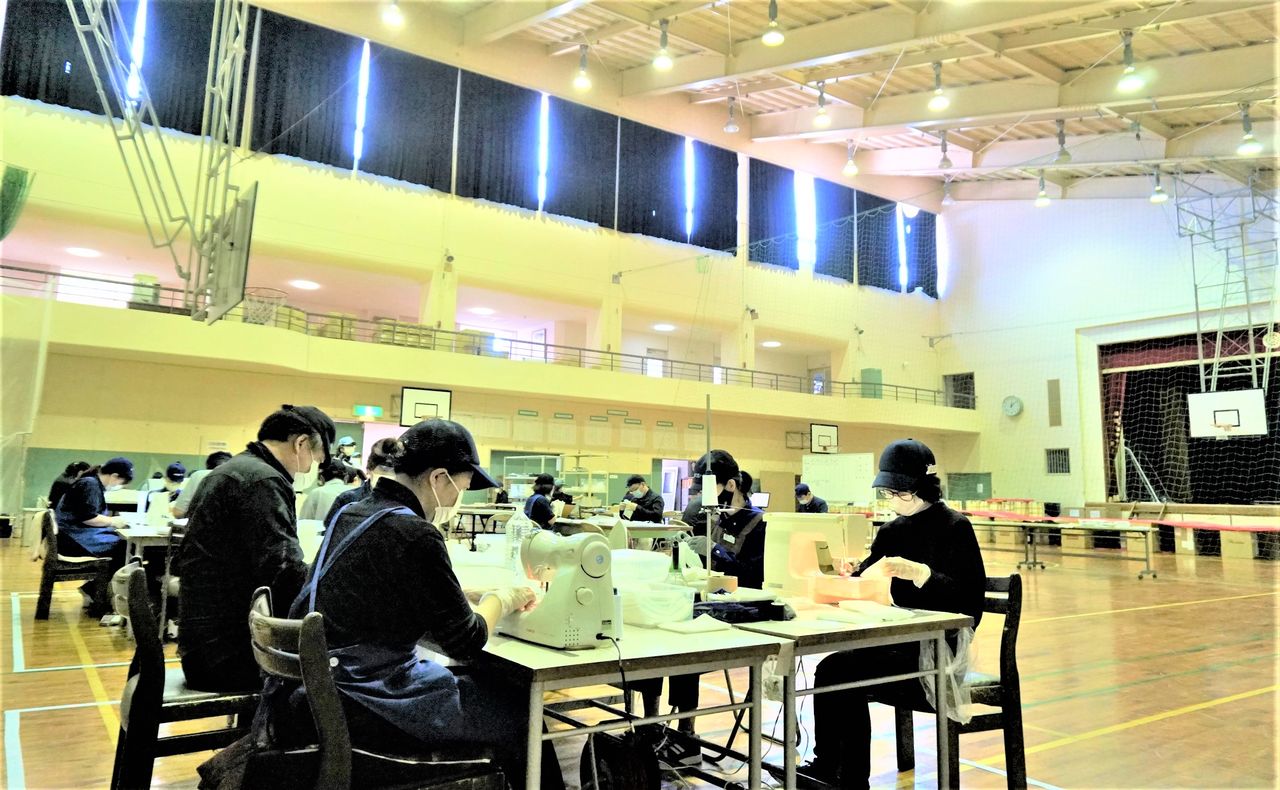
Employees work on the latest batch of masks in the company’s workspace in an abandoned school gym. (Photo courtesy of Marui Orimono)
Marui Orimono is a leading manufacturer of synthetic fibers, but like Hatta Warp Knitting, it had never made its own apparel products. However, Okajima Aya of the business planning division explains that the company saw the demand for masks coming. “We have a factory in China, so we were aware of the spread of the coronavirus early on,” she recounts. “Even from January, we realized there would be a demand for masks that would be comfortable in the intense summer heat.” This speedy response has brought rewards.
The firm originally planned to produce around 5,000 masks a month. But when it started selling the coverings on its website in late March, orders streamed in from around the country, reaching more than 20,000 in under a month. The factory was soon running flat out even on weekends. Long-term forecasts published by the Japan Meteorological Agency are for extremely high average temperatures throughout Japan this summer, and the company is currently accelerating plans for a new, improved design for an even cooler mask.
(Originally published in Japanese. Banner photo: A worker sews a denim mask. Photo courtesy of Aoki Hifuku.)